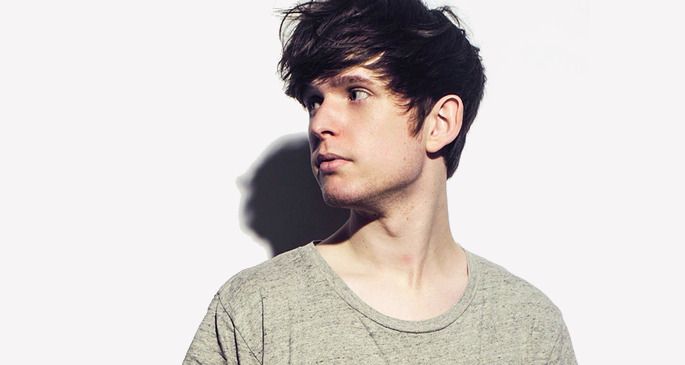James Blake does a lot with a little

Imagine it's a Tuesday, whatever that means for you. Maybe Tuesdays are shitty because that's the day you have to fill out your weekly timesheet or have a touch-base with your boss whose base you'd rather not be anywhere near, let alone touch. Or maybe Tuesdays are good because it's not Monday anymore and you feel some semblance of cognitive function returning after yet another weekend bender. Maybe Tuesdays are just okay – it's Tuesday, it's fine, whatever. In any case, imagine it's a Tuesday, and you've just come to some remarkable realization, seemingly out of nowhere. A realization about God or the universe or what you're going to have for lunch, it doesn't matter. Something just clicked. It brings you that feeling of excited clarity that's almost impossible to put into words. Perhaps it's best described as the convergence of, I dunno, serenity and mania? Catharsis and insight? A certain vibration that starts in your chest and lands somewhere around your eyeballs? I don't know.
When writers can't adequately describe something, we resort to what else language affords us: metaphor, analogy, second-person hypothetical ramblings, all of which are featured prominently in the paragraph above. As I've frequently admitted, brevity is not my default gear; my writing requires a lot of up-shifting and down-shifting and killing-of-the-engine before it gets there. And when I'm trying to convey something convoluted or nuanced or just human, I'm not sure I ever really arrive at the concise, snappy prose that I want. I'm certainly not there right now.
If I had a deeper and wider toolbox, maybe I'd resort to some other form of expression: visual art and music come to mind as genres that are able to represent, produce, or stand in for the feelings beyond that which language can capture. But I can't play an instrument, or carry a tune, or sing, or paint, or draw, or mold, or build. You may suggest, "just practice!," but I'm also short on patience and discipline, and I'm lacking a healthy barometer for progress. So, yeah.
James Blake has found his way into my Spotify Wrapped for as many years as Spotify has been Wrapping. I used to think it was because I have an obsession with "Lindisfarne II," a short, jumbled, chilling song from his self-titled album. And maybe it is, in part. But I've started to get a little more forensic with it, and I think it's something else that's drawn me to Jimmy all these years. He, too, has complex human emotions and experiences to express, and he can't very well write a long-winded blog post and call it "lyrics." Of course, it helps that he's got some of the best production chops on earth: it's no wonder nearly every artist under the sun wants to collab with him. But before he was making beats for Beyoncé, SZA, Mount Kimbie, Kendrick Lamar, and Rosalía, he released sparse, rhythmic electronic music featuring no one but himself. It's this stuff – from his 2010 EP CMYK until 2016's The Colour in Anything – that keeps James Blake among my most listened-to artists year after year.
A lot of songs on these records, especially early on, are totally devoid of lyrics. If there is a voice featured, it's a chopped-up, muddled sample of either 90s R&B or Blake himself. You can't make out the words, but that's kinda the point: the distortions and asymmetry are all part of his aesthetic MO. And then there are, on the other hand, songs whose words seem to be doing a lot of heavy lifting. If you look up the lyrics to these tracks – "The Wilhelm Scream," "To the Last," "Radio Silence," "Modern Soul," for example – you won't be doing much scrolling. It's not that they're short songs, necessarily, but that they don't have many words – or at least many different words. So much of Blake's discography features songs that rely on the constant repetition of a very short, let's say, chorus? If you can call it that? It's sometimes just one or two phrases. Take "Radio Silence," for instance: more than half of the song's lyrics consist of only two lines: "I can't believe this/You don't want to see me." In the background, there's a simple metronomic cymbal overlaid with a synth that sounds like it's announcing the sunrise. On "Voyeur," 40 of the 54 lines are the same: "And her mind was on me." A cowbell-like percussion dings throughout the song, over a psychedelic beat that could be the theme song to doomsday.
These songs are as good as they are different, and they're really fucking good. For me, it has a lot to do with the economy of Blake's sound: the short, punchy, often non-sequitur-like lines, the stylized vibrato, the rhythm. We don't need a story or context or follow-up – it's all right there. Even if we haven't personally experienced the longing, heartbreak, spite, helplessness, or whatever else Blake showcases in these songs, by the end we become haunted by it.
For now, it seems Blake is content making catchy, lucid beats for pop-stars, and that's fine, too. I like those songs. But I long for him to return to the hypnotic simplicity that lured me in over a decade ago, if only for a little while.